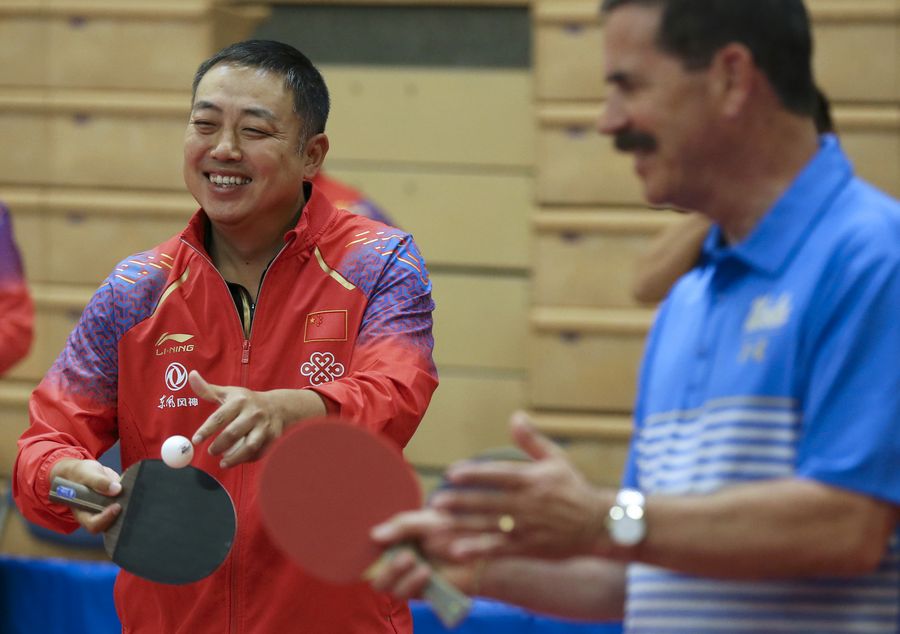
Liu Guoliang, president of Chinese Table Tennis Association, teams up with a representative of University of California, Los Angeles (UCLA) for a table tennis game on Aug. 17. (Xinhua/Li Ying)
Forty-eight years ago, the small ping-pong ball moved the big ball of Earth as it thawed the relations between the United States and China. The legacy of the ping-pong diplomacy lives on.
by Julia Pierrepont III, Gao Shan
LOS ANGELES, Aug. 18 (Xinhua) -- The spacious basketball court in John Wooden Center of the University of California, Los Angeles (UCLA) was strewn with small white balls Saturday afternoon.
One hundred lucky spectators invited from sports clubs around the LA area oohed and aahed as hundreds of tiny white plastic ping pong balls whizzed, bounced and yes, pinged, from two long rows of green tables to the red-carpeted floor as the China and U.S. national table tennis teams participated in a historic joint-training session.
In a historic first and at the invitation of the United States Table Tennis Association (USATT) and the U.S. Olympic Committee, China's national table tennis team - the reigning world champions by any standard - has come to LA from August 5th to 25th to practice with the U.S. national table tennis team.
Visiting luminaries include Olympic Champions Ding Ning, Ma Long and a superb elite coaching staff of former world champions and Gold medal Olympians.
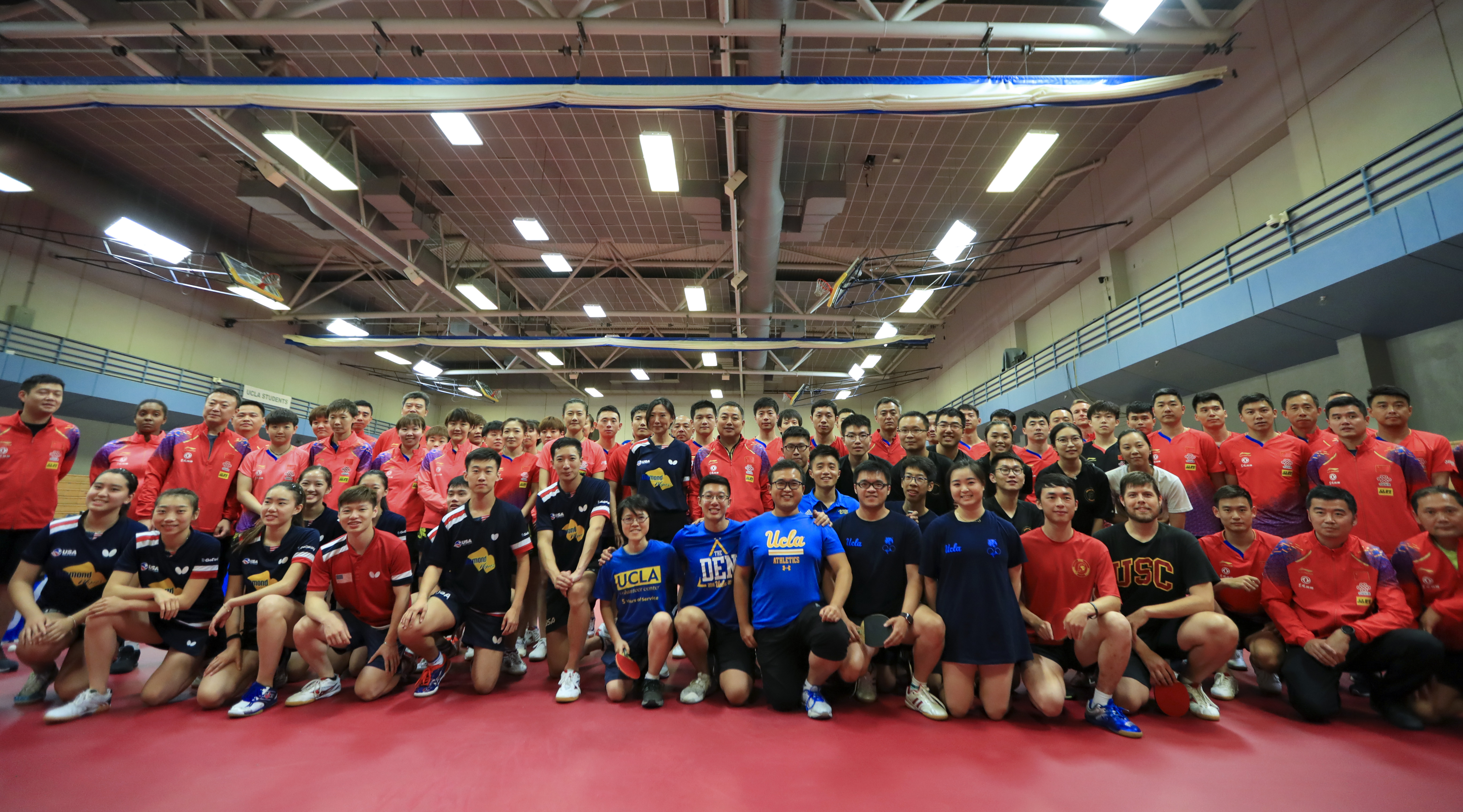
Members of national table tennis teams of the United States and China, athletes from the UCLA and The University of Southern California pose for a group photo on Aug. 17. (Xinhua/Li Ying)
Virginia Sung, CEO of USATT, is thrilled about what this historic opportunity means for her players.
"When you play with the best of the best, there is so much to learn," she told Xinhua. "Our U.S. players will learn what it takes to be the best in the world: the technique, discipline, and a fresh perspective on how much dedication, hard work and sacrifice is required to stand on top of the mountain."
Kai Zhang, a member of the U.S. men's national team, told Xinhua, "The Chinese team knows a lot more than the U.S. team about table tennis techniques and the psychological aspects of the game, so we can learn a lot from them."
In the midst of trade tensions between the United States and China, these young ambassadors of sport take on additional responsibilities.
"Being able to practice with Chinese team here in LA will definitely create closer relations between the U.S. and China and help strengthen diplomatic relations between our two countries. And that's a good thing," Crystal Wang, a member of the U.S. Women's Team and an Olympic hopeful for 2020, told Xinhua.
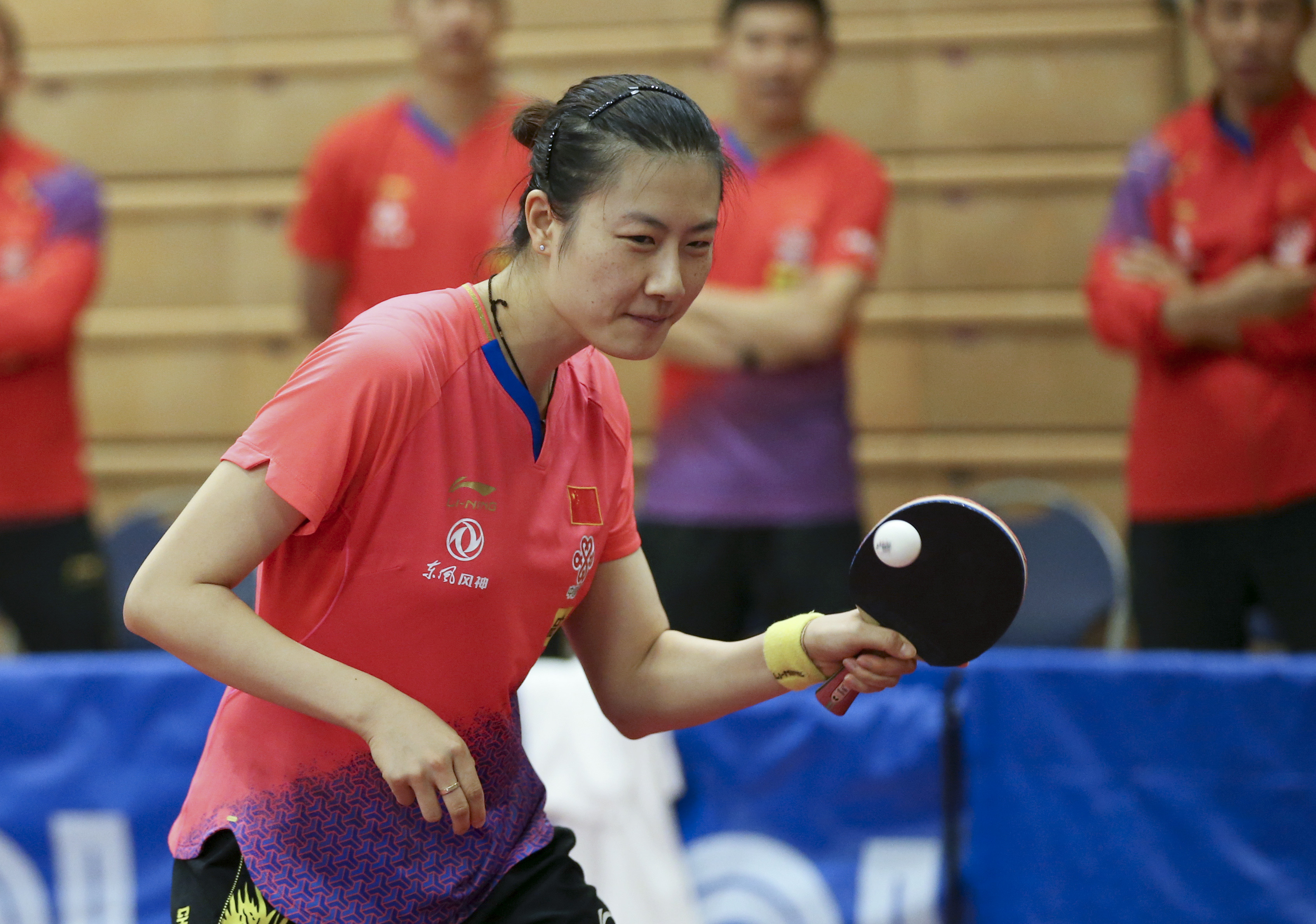
Chinese Olympic gold medalist and world champion Ding Ning seen during a game on Aug. 17. (Xinhua/Li Ying)
Ping Pong, or table tennis, has a unique and storied place in the diplomatic relations between the United States and China. In 1971, nine American table tennis players were invited to Beijing for exhibition games with Chinese players, helping break the ice between China and the United States and lay the groundwork for the eventual establishment of diplomatic relations between the two countries.
"Everyone knows ping-pong diplomacy is how our two peoples were able to get reconnected and start the process of opening to each other," reminisced Chinese Consul General in Los Angeles Zhang Ping, as he addressed the assembled teams and spectators in John Wooden Center.
"And over the years, the China national team and players have carried on that ping-pong diplomacy legacy and traveled to many countries not only to compete, but in the spirit of friendship and to cultivate friendly relations with each other's peoples," he added.
Justifiably proud of China national team's achievements, the consul general applauded their extracurricular efforts off the court, "You are not only helping to train the American players, but also have the chance to mix with American society and let people know you are the friends of the American people."
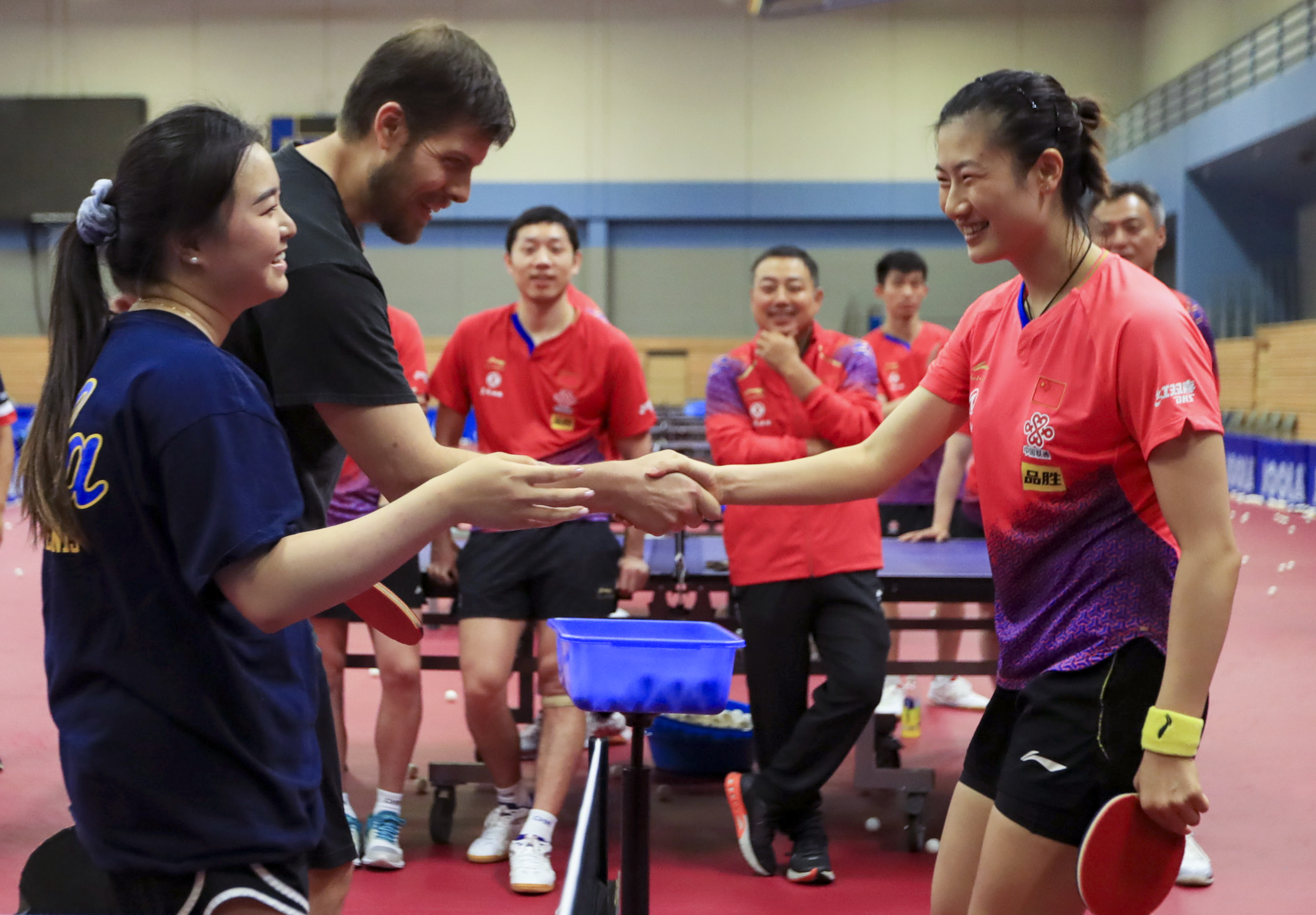
Chinese national table tennis team member Ding Ning shakes hands with athletes from The University of Southern California on Aug. 17. (Xinhua/Li Ying)
Liu Guoliang, president of Chinese Table Tennis Association, seconded that notion, "It is already the 48th anniversary of ping-pong diplomacy and since the first time, we've had generations of Chinese and American players who share the spirit of ping-pong diplomacy and continue it today."
Liu also believes China's national table tennis team has an additional responsibility, "Because we are the major force in global table tennis, we have a responsibility to promote it around the world."
Moreover, he sees his team's LA visit as a win-win opportunity for China's coaches and players to learn more about sports culture from the United States.
"The United States is very strong in so many sports like baseball, football and basketball. And they are also so successful in terms of marketing them and we want to learn that from them to promote the internationalization and professionalism of table tennis," he told Xinhua.
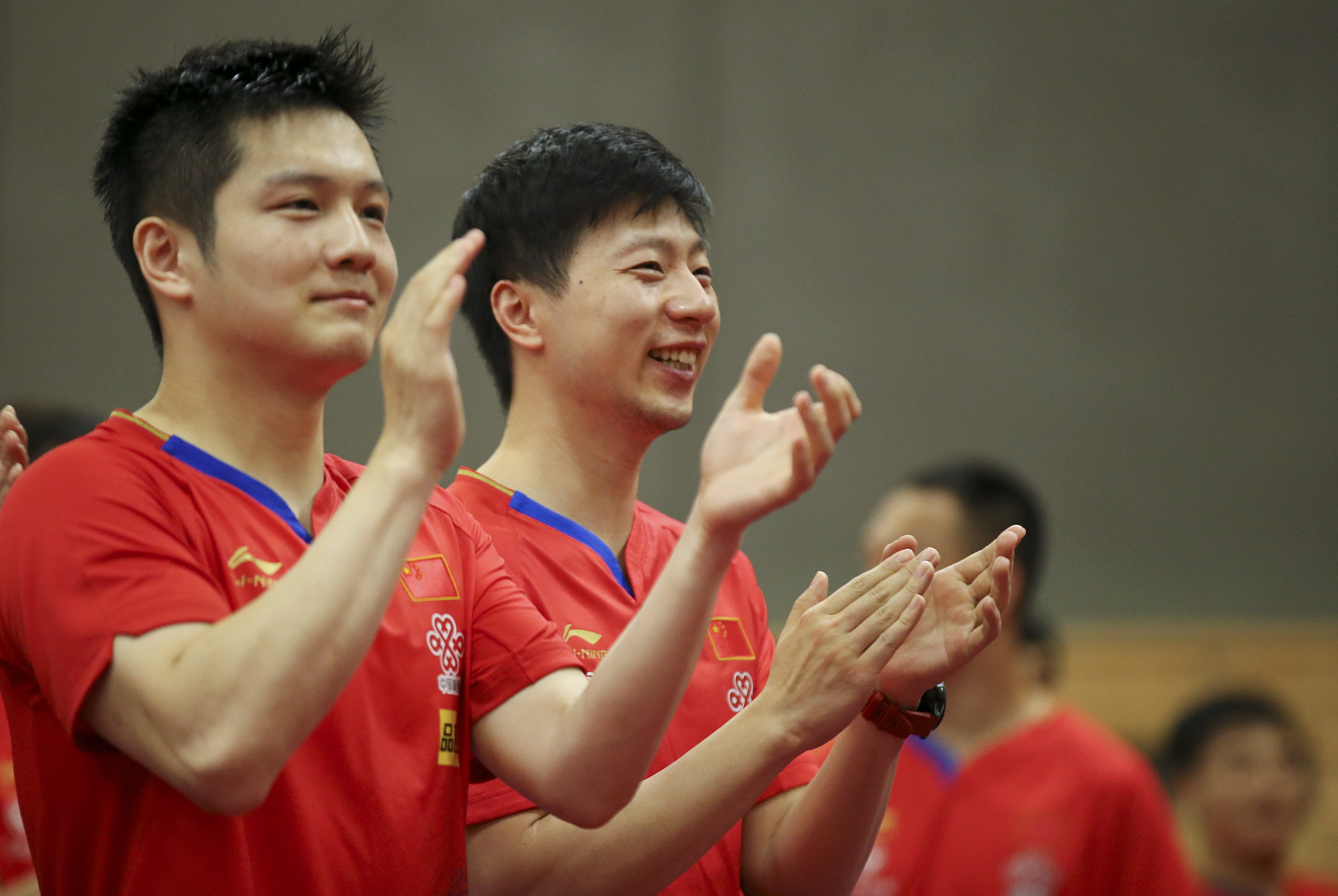
Ma Long (R), Chinese national table tennis team member, claps with teammate Fan Zhendong on Aug. 17. (Xinhua/Li Ying)
Many spectators were excited to witness the training of Chinese Olympic gold medalists and world champions.
David Zeng, ranked 27th in the U.S. Table Tennis Nationals and Captain of the UCLA Ping Pong team for the last 3 years, told Xinhua, "It's really exciting to have the Chinese team here and be part of this historic event."
Michael Wang, president of UCLA Table Tennis, said, "Our team is pretty good, but compared to the Chinese national team we're nothing. We're just really glad we got this opportunity to see them play."
Two-time U.S. Olympian (2000 & 2004), Tawny Banh, who runs the American LA Table Tennis Association of El Monte, California, told Xinhua, "I wanted my members to have opportunity to witness world class training. The difference in the level of play is obvious - their strokes, their form, footwork, and technique - the Chinese are the best in the world!"
"This is a once in a life time experience to learn from the Chinese champions. I'm learning a lot," said Wang, the U.S. Women's team player.



